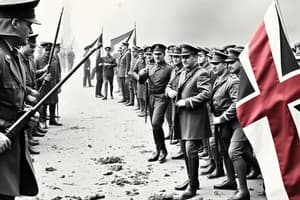Podcast
Questions and Answers
Explain how militarism contributed to the beginning of World War I.
Explain how militarism contributed to the beginning of World War I.
Militarism contributed by creating tensions among countries, leading to increased military buildup and alliances, such as the formation of the Triple Alliance by Germany and the alliance between Russia and France.
What political circumstances in Europe led to World War I?
What political circumstances in Europe led to World War I?
The rise of the German Empire in 1871, militarism tensions, and the assassination of Archduke Franz Ferdinand heightened political circumstances, leading to the formation of alliances that drew multiple countries into the conflict.
What events motivated the United States to join the war?
What events motivated the United States to join the war?
The U.S. was influenced by debates about war preparation, British propaganda, inspections of ports for contraband, and Germany's violation of an international treaty, which ultimately led to a declaration of war.
Write a letter to President Wilson about what you think he should do regarding the sinking of the Lusitania.
Write a letter to President Wilson about what you think he should do regarding the sinking of the Lusitania.
Write a short essay comparing and contrasting the factors that caused European nations and the United States to become involved in World War I.
Write a short essay comparing and contrasting the factors that caused European nations and the United States to become involved in World War I.
Flashcards are hidden until you start studying
Study Notes
Militarism and World War I
- Militarism heightened tensions among European nations, leading to complex alliances and arms races.
- Germany formed the Triple Alliance (with Austria-Hungary and Italy) in response to perceived threats from France in 1870.
- Russia allied with France in 1894, further increasing military rivalries.
Political Circumstances in Europe
- By 1871, the German Empire had emerged as a dominant power in Europe, altering the political landscape.
- Political tensions and the assassination of Archduke Franz Ferdinand were pivotal in escalating conflicts that led to WWI.
- The web of alliances meant that a conflict involving one nation could easily involve multiple countries, triggering widespread warfare.
U.S. Motivation to Join the War
- Initially, President Wilson aimed for U.S. neutrality amidst global tensions.
- Domestic debates over war preparedness played a significant role in shaping public opinion.
- Propaganda from British officials and inspections of U.S. ports for contraband influenced the U.S. stance.
- Germany's violation of treaties regarding maritime conduct ultimately compelled the U.S. to declare war.
Impact of the Lusitania Incident
- The sinking of the Lusitania resulted in over 100 American casualties, escalating calls for U.S. involvement.
- Survivors and citizens urged President Wilson to take action in response to German aggression.
- The incident exemplified the growing sentiment that neutrality was no longer tenable in light of American lives lost.
Comparison of European Nations and U.S. Involvement
- European nations were actively engaged in preparations for war, driven by existing alliances and militaristic ambitions.
- The U.S. public was initially resistant to entering the conflict, emphasizing neutrality until specific provocations.
- The Lusitania incident marked a crucial turning point, illustrating the differing approaches to war engagement between Europe and the United States.
Studying That Suits You
Use AI to generate personalized quizzes and flashcards to suit your learning preferences.




